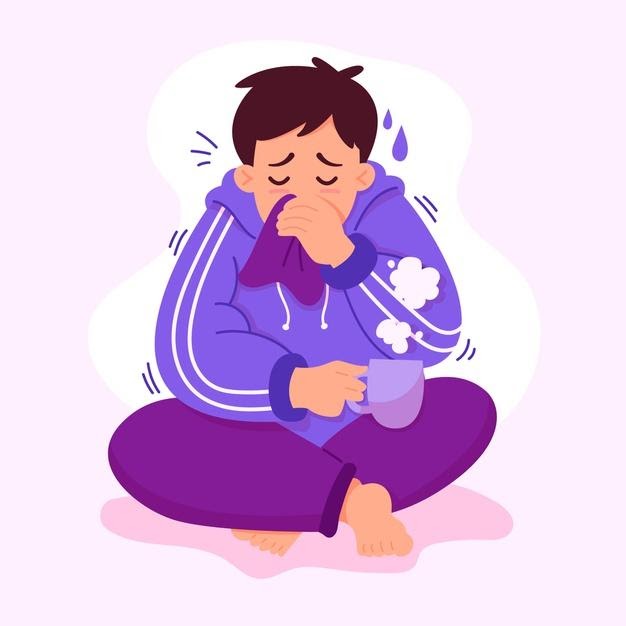But as COVID-19 has created a horrifying impact on our lives, we can't help but expect the worse when we experience these symptoms. We immediately start worrying about the implications of this deadly disease and carry a huge mental burden in the process.
Now, what if we tell you that there is a way you could tell these diseases apart by looking at the symptoms? It'd save you the soul-crushing moments of despair you'd be spending if you run for getting a COVID test every time you feel under the weather, right?

Let's dive right in and understand what the similarities and differences between flu, allergy, and COVID-19 are.
What is "Allergy"?
Seasonal allergies, popularly referred to as "hay fever," really aren't caused by some kind of virus (or directly by hay), but by pollen, usually released in fall and spring.
Allergic reactions arise when normally harmless allergens are misrepresented by our immune system as harmful toxic objects, and its attempts to fend them off.
Typical symptoms of an allergic reaction include:
-
Coughing and Sneezing
-
Wheezing in some cases
-
Runny and Stuffy nose
-
Sore throat for a long period
-
Rash on a skin
-
Watery eyes
If you are facing any of these symptoms simultaneously, it would not be inaccurate to diagnose that you're facing an allergic response to something. However, for your assurance, it is always good to get tested and contact the UK pharmacy for getting the best medications.
What is the flu?
Flu is a respiratory disorder, also known as influenza. Mostly, it causes a mild illness, but, in some cases, it creates a grave situation that could lead to death as well. Flu is completely different from a common cold from the very onset of the disease. Unlike the common cold, it has a sudden onset, and that distinguishes flu from the common cold.
Flu is caused by a virus and displays signs and symptoms the same as that of COVID-19. However, it is completely possible to treat and prevent flu, unlike COVID.
Since some of the indications and symptoms of the flu are so identical to COVID-19, if you think you've caught the flu, a test might be required to help validate a diagnosis. Contact our online pharmacy in the UK to schedule an appointment at the earliest.
Common symptoms of flu can be listed as below:
-
Fever
-
Constant coughing
-
Fatigue
-
Muscle pain
-
Headache
-
Diarrhoea and vomiting in children
-
Runny and stuffy nose
-
Sore throat
What is a seasonal "Cold"?
This has no fever in particular and is much more distinguished by sneezing and a runny or stuffed nose. Although the symptoms are similar to that of COVID-19, they are not typically the ones to identify coronavirus infection. According to the CDC, most people who rest well can heal from a cold in about ten days. Those with a weak immune system can also develop a more chronic infection. The common cold is a milder illness as compared to the flu.
Symptoms of cold:
-
Coughing (often bringing up mucus)
-
Sore throat
-
Runny nose or nasal inflammation (usually smoother, dyed mucus)
-
Tiredness
-
Pains and aches
-
A mild fever
What is Coronavirus?
Covid-19 is an infection caused by a strain of the coronavirus which was recognized in December 2019. Many types of coronaviruses are involved in causing different diseases. However, COVID-19 infection has led to a pandemic we are currently a part of. This contagious strain affects the lungs. Some people might show minor symptoms; however, others may be infected severely, which can cause pneumonia or fatal damage to the lungs. Although many symptoms of COVID-19 infection resemble flu symptoms, they are caused by different viruses.
Coronavirus can have a time of exposure which is longer, and the symptoms show up any time after 2 to 14 days of infection. According to the CDC, the prominent symptoms of COVID-19 are:
-
Congestion or runny nose
-
Cough
-
Diarrhoea
-
Fatigue
-
Fever or chills
-
Headache
-
Muscle or body aches
-
Nausea or vomiting
-
New loss of taste or smell
-
Shortness of breath or difficulty breathing
-
Sore throat
The World Health Organisation (WHO) explains that far more life-threatening complications such as influenza, acute respiratory distress syndrome, renal failure, and death may be caused by extreme COVID-19 events.
Symptoms shared by COVID-19 and flu
Ill health can make you wonder which of the illnesses you may be suffering from especially when they seem to mimic coronavirus. The common part is that both COVID-19 and flu are caused as a result of contagious viruses and are highly infectious. Here are the symptoms that they share in common:
-
Fever or feeling feverish/chills
-
Cough
-
Shortness of breath or difficulty breathing
-
Fatigue (tiredness)
-
Sore throat
-
Runny or stuffy nose
-
Muscle pain or body aches
-
Headache
-
Some people may have vomiting and diarrhoea.
-
Lack of appetite
Populations at high risk for COVID-19
The CDC states that adults who are older than 65 years of age or those who have conditions like asthma, diabetes, or heart diseases are more prone to developing the infection. Young children are comparatively less affected but are still vulnerable. The potential risk factors have been identified as:
-
Age
-
Certain occupations (E.g., Healthcare workers)
-
Poverty and crowding
-
Chronic medical conditions
Conclusion
Thus, although different, all these conditions need to be treated at the earliest for better health. So, if you observe any of these symptoms, visit your doctor, get the necessary tests done, and rush to our online chemist to get the necessary medications to walk off these conditions. Lastly, prevention is always better than cure. So, don't forget to get your flu shot this winter to protect yourself from the upcoming twindemic.






